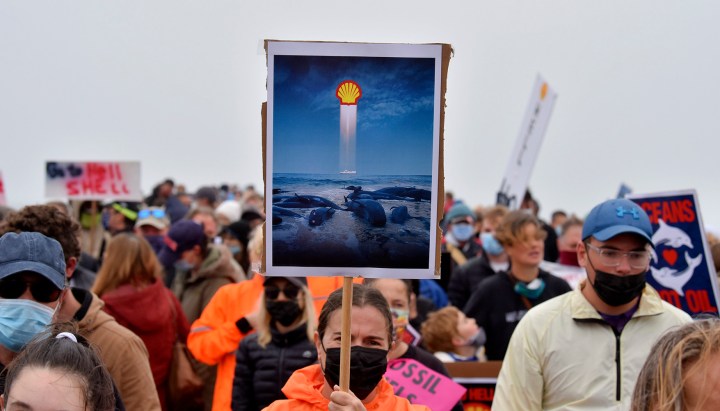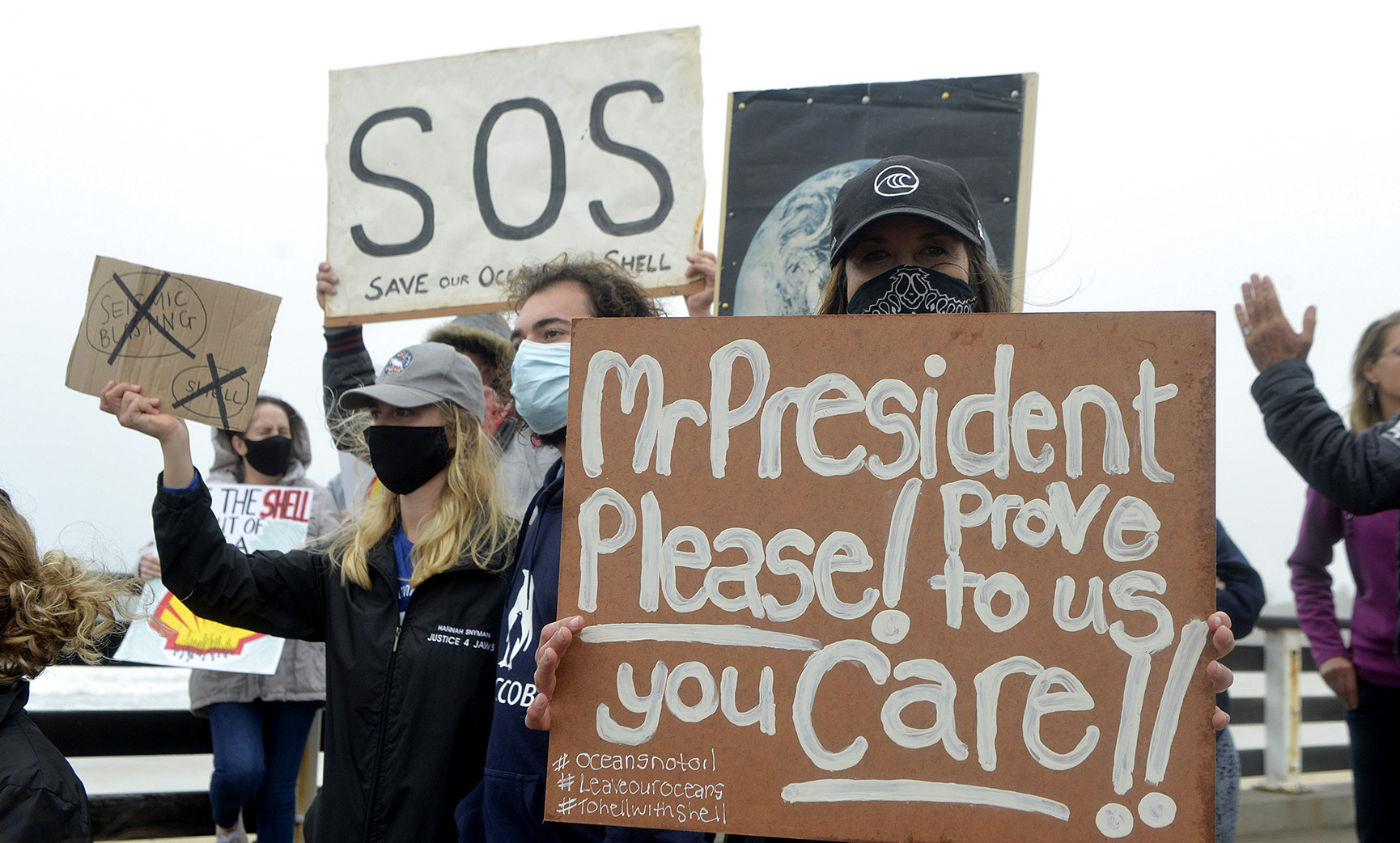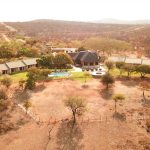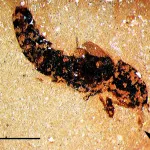Our Burning Planet
Shell says blasts won’t cause harm so new court application is not urgent

The multinational oil and gas company argues that there is no evidence that there will be substantial irreversible damage from its seismic survey and that they should be allowed to continue.
Shell South Africa chairperson Hloniphizwe Mtolo, in his answering affidavit to the urgent application brought by the seven applicants to interdict Shell from conducting seismic survey between Gqeberha and Ramsgate, argued that there is no evidence that there would be substantial irreversible damage from the exploration work.
According to Mtolo, the survey is already under way and there is no reason why the application could not be heard on a more reasonable timeframe.
Mtolo’s answering affidavit comes after environmental law firm Richard Spoor Attorneys and the Legal Resources Centre representing Sustaining The Wild Coast, Mashona Wetu Dlamini, Dwesa-Cwebe Communal Property Association, Ntshindisk Nongcavu, Sazise Maxwell Pekayo, Cameron Thorpe, and All Rise, Attorneys for Climate and the Environment applied for an urgent interim interdict on December 2, calling for a halt to Shell’s survey.
This is the second court bid to stop Shell from conducting the survey to locate hydrocarbon reserves between Gqeberha and Ramsgate. It was due to be heard on Tuesday but was postponed and set down for Friday.
Earlier this month, a similar application for an interdict was dismissed with costs by the Makhanda High Court Acting Judge Avinash Govindjee.
Govindjee ruled that submissions about the detrimental impact of the survey on the environment and marine life were “speculative at best” and the applications had not proved a reasonable apprehension of irreparable harm.
In his founding affidavit, director of Sustaining the Wild Coast, Reinford Sinegugu Zukulu, and Wild Coast community representatives asked the court to allow them to admit affidavits of several experts to prove that the airgun barrage was likely to cause significant harm to marine animals.
The experts argued that Shell’s 2013 Environmental Management Programme (EMPr), which gave details of the seismic survey and proposed mitigating measures, was outdated.
A US-based expert in behavioural and acoustic ecology with marine mammals, Dr Douglas Nowacek stated that evidence gathered since 2013 shows exposure to unwanted sound causes behavioral and physiological harm to marine mammals, including “chronic stress” which is particularly worrying for the endangered populations of whales off the Wild Coast.

05/12/2021 . Gqeberha (Port Elizabeth ) at Hobie Beach, Shark Rock Pier, protest against Shell Seismic Blasting on South African coast . (Photo: Deon Ferreira)
Mtolo, in his affidavit, argued that the applicants had failed to make out a case for the relief sought in the notice of motion and the application should either to be struck from the roll with costs, including the costs of two counsel; alternatively be dismissed with costs, including the costs of two counsel.
“Shell respectfully notes the great importance that the sea plays to local communities’ livelihoods, not only to sustain their livelihoods through custom fishing practices but also the important role that the sea plays in communities’ cultural and spiritual expressions,” he said.
He said Shell is certain that the seismic survey will not have an impact on the local communities’ livelihoods in terms of their ability to fish and practise their cultural customs along the shoreline.
“I say so for the following reasons: the survey is being conducted too far away from where the communities fish and enjoy the ocean to be detrimental to their interests at all. The distance between the closest survey line and shoreline is approximately 20km. The closest survey line is located at minimum 7,5km from the Dwesa Cwebe MPA [Marine Protected Area], which is designated for providing important habitat for several fish species, as well as being an important feedstock for custom fishing of the local communities,” Mtolo said.
He said considering the below predicted disturbance distances and maximum distance of the survey from the coastal fishing areas and the MPA, it is unlikely that the level of underwater sound will reach the boundary of the MPA or even further near shore fishing areas above thresholds of any physiological or behavioural significance for fish, eggs and larvae.
According to Mtolo, Shell has not had an adequate opportunity to interrogate and respond to the evidence, especially the new supplementary evidence filed on 7 December 2021, adduced by the applicants.
“Shell has done its best to provide as comprehensive a response as possible in the circumstances but persists in arguing that the timetable applicable to the determination of this application is not conducive to the fair determination of the relevant issues,” he said.
Mtolo said Shell disputes the urgency of this application and contends that the manner in which it has been brought – including the belated filing of hundreds of pages of additional affidavits and “specialist evidence” – constitutes an abuse.
“When one reads the founding affidavit, one gets the impression that the seismic survey that is being conducted by Shell is an unprecedented environmental catastrophe, unsupported by expert evidence and with constant sound ‘blasts’ resulting in certain harm to sea life. Indeed, this appears to be the deliberate impression that the applicants are trying to create, both before this court and in the media. The impression is, regrettably, misleading and based on incorrect facts and fear mongering half-truths,” Mtolo said.
Mtolo’s affidavit stated that the seismic survey will not have significant detrimental environmental impacts, despite what is stated by the applicants.
“Numerous seismic surveys have already been conducted safely offshore South Africa without adverse impacts to the environment. Seismic sound is not an ‘explosion’ but rather a collapsing air bubble that emits low-frequency sound that travels through the subsurface to a target depth. The main energy is the air bubble collapsing. The energy emitted from the collapsing air bubble is directed downwards into the seabed rather than outwards,” he said.
Mtolo said there have been at least 35 3D surveys conducted offshore of South Africa and numerous 2D seismic surveys, including 11,290km of 2D seismic data obtained in the area covered by the exploration right (ie ER 252) which is the subject of this application.
“To date, there is no research globally showing that serious injury, death or strandings of marine mammals has occurred from exposure to sound from seismic surveys when the appropriate mitigation measures are implemented. In the last five years there have been 11 seismic surveys acquired offshore South Africa of which three started acquisition in December,” he said.

Kei Mouth Village on the Wild Coast. (Photo: Supplied)
Mtolo said to his knowledge, the latest 3D offshore seismic survey in South African waters was acquired in 2020 by Total.
“The Total survey followed a similar procedure to the Shell survey in as much as soft start procedures, Marine Mammal Observers [MMO] and Passive Acoustic Monitoring [PAM] were successfully applied with no recorded negative impact on marine life. During the total duration of this survey, 57 separate sightings of cetaceans [whales] and turtles were recorded via MMO and PAM, comprising 44 sightings of odontocete cetaceans [toothed whales], 11 mysticete cetaceans [baleen whales] and two turtle sightings [loggerhead and green].”
“Of the marine mammal sightings, the airguns were operational during 28 of the sightings. There were, however, only four occurrences of marine mammals entering the 500 111 mitigation zone when airguns were active,” he said.
He said the attempt to paint the seismic survey to be conducted by Shell as extreme or unprecedented is misleading and false.
“The survey began on 8 December 2021 and is scheduled to run for approximately four to five months until March/ April. The expert evidence is that commencing now is the most appropriate step to take, from an environmental perspective, to prevent interference with whales during June to November. In other words, the window now selected, with the mitigation measures adopted, is the safest window in which to conduct the survey,” said Mtolo.
He said no seismic activities will be undertaken within any declared MPAs.
“A 5km buffer zone will be maintained around MPAs which exceeds the current standard in South Africa of a 2km buffer zone around MPAs,” added Mtolo.
He said the applicants were aware of the earlier application, which was launched before the survey commenced, but elected to hold back on their application – seemingly to get a second bite at the cheese.
“Their explanation for not joining the earlier application is patently unacceptable. They give two reasons. First, that some of the supporting affidavits were not ready. Secondly, they were not satisfied with the relief sought by the earlier applicants. The first explanation is contradicted by their conduct of this matter-they showed no reluctance to file voluminous supplementary evidence six days after launching. If they were willing to do that in this application, they could have sought to intervene in the earlier application and supplemented their papers thereafter,” Mtolo argued.
He said the second explanation is bad because in substance the earlier application sought the same interim order as sought in the present application.
The applicants in this matter are from communities along the Wild Coast who say they learnt about the proposed seismic study after a notice was widely publicised.
In their papers, they argue that the survey will cause significant harm to the environment and to their livelihoods, culture, and heritage.
They also argue that the survey will not only be harmful, it is also unlawful as it is common cause that Shell does not have an environmental authorization to conduct the exploration right in terms of the National Environmental Management Act.
The other respondents in the matter are Minister of Mineral Resources and Energy, Minister of Environment, Forestry and Fisheries, South Africa BV, Impact Africa Limited and BG International Limited.DM/OBP




















 Become an Insider
Become an Insider
Yeah we can totally trust the word of a company that has had people murdered to get their way.